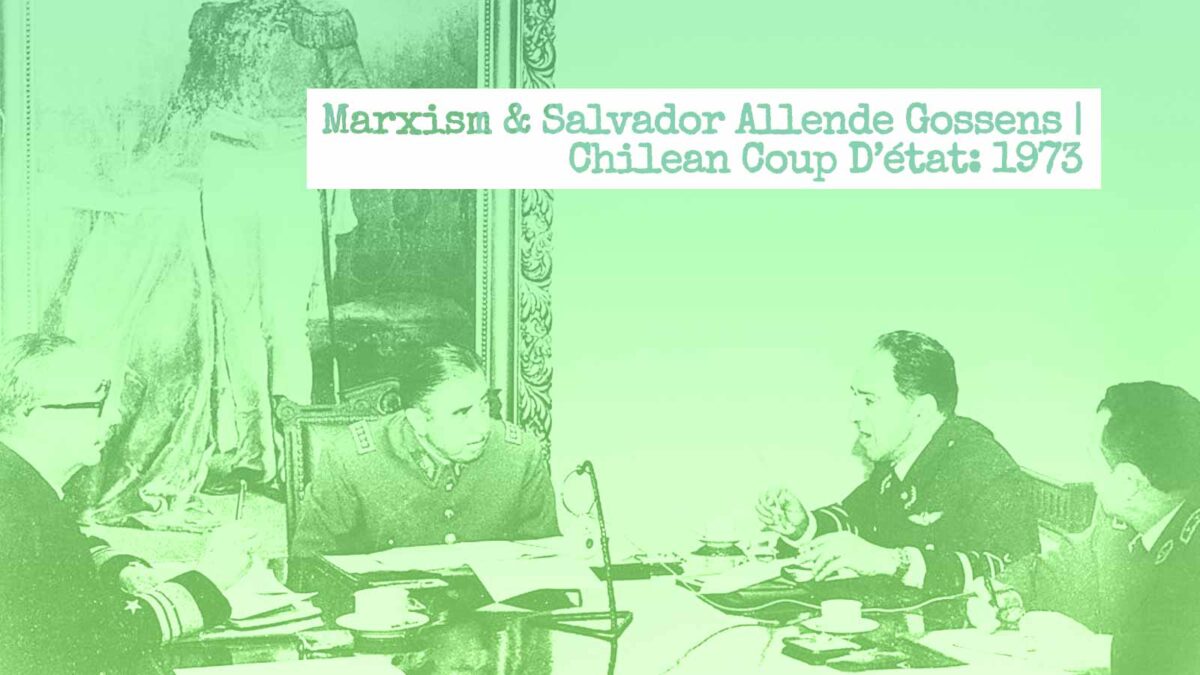Living in Chile as a medical doctor, Salvador Allende was an avid supporter of the Socialist cause. During the years previous to his presidential election, he watched Chile fall into economic instability as a result of mal-distributed wealth. Openly in opposition of Capitalism, Allende served as a member of the Chilean Senate. Allende founded, in part, the Socialist Party of Chile, pushing for communistic reforms in order to lessen the discrepancy between the wealthy and the poor. Allende received constant criticism and animosity on behalf of his Marxist beliefs, and his inherent will of turning Chile into a communist state, similar to that of Cuba. Despite Allende’s strong attempts to stabilize the Chilean economy through socialist reforms, the economy dove deeper, as if fated, resulting in the Chilean Coup D’état of 1973.
After two failed Presidential campaigns, Allende was elected by a slim margin, representing the “Popular Unity” coalition. The Nixon Administration was not pleased with the results of this poll, for they had not expected Allende to win the majority. The CIA strongly urged the Chilean congress to inaugurate Alessandri, the runner-up, who would in turn resign immediately. This would give Eduardo Frei, the previous president, constitutional rights to run for presidency, which was originally denied on the grounds of limited consecutive terms. Despite these efforts, however, Congress inaugurated Allende and President of Chile in 1970.
The newly appointed president was faced with a volatile economy. “Chilean society was already racked by economic difficulties. Problems such as slow growth, inflation, maldistribution of income and the concentration of economic power remained stubborn and intractable” (wikipedia). Eduardo Frei had left Allende to stabilize not only a government economically, but also a country socially. Two contrasting groups within its society plagued Chile, making Allende’s socialist reforms both loved and despised. The Allende Administration appropriated an income tax to those whose income exceeded a set amount. Although this taxation helped reduce international debt, it only furthered trans-class animosity, garnering governmental support from the working class while angering those of the middle and upper class. “Thus, the country was polarized” (wikipedia).
Within the early stages of Allende’s term and such socialist reforms as industry nationalization, health care, educational and agrarian reform, economic and social statistics were favorable. Inflation had been reduced along with levels of unemployment and over a ten-percent growth in industries had occurred. These encouraging improvements, however, were deceptive, and in 1972 Chile fell into the depths of economic crisis. Inflation soared from levels of 22% to 140%. The government was forced to set standard prices on ordinary market goods, leading to an illegal and highly lucrative trading of such produce.
As the cost of imports increased, the value of copper, Chile’s chief export, diminished by a costly 24%. Unions formed and strikes took place. Citizens alike joined to strike against the government that had led their country into its state of catastrophe. Attempted but failed coups began to take place, the first on June 29, 1973, the second almost a month later. On August 9th, Carlos Prats, General of the Chilean Army was appointed Minister of Defense. His new position, however, along with his status as General was lost on August 22nd, as a large majority of the military opposed Prats’ appointment. Enter, stage right, Pinochet, the new Commander-and-Chief of the Chilean Army.
Levels of instability only heightened as Congress accused Allende as being unable to govern Chile. It seemed that the government could no longer call upon national police to trustfully fulfill their will, and many felt as though the government could no longer uphold domestic law. And in late August, the Chamber of Deputies issued a document charging the government with insufficiently governing Chile, and allowing the nation to slip into unconstitutional shambles. Amongst other claims, this document stated that Allende wished to “conquer absolute power with the obvious purpose of subjecting all citizens to the strictest political and economic control by the state with the goal of establishing a totalitarian system” (josepinera.com).
Allende responded stating, “Chilean democracy is a conquest by all of the people. It is neither the work nor the gift of the exploiting classes, and it will be defended by those who, with sacrifices accumulated over generations, have imposed it… I solemnly reiterate my decision to develop democracy and a state of law to their ultimate consequences” (wikipedia). Despite his attempts to reconcile his amounted levels of hostility, a coup d’état took place on September 11th, 1973. General Pinochet of the Chilean army led the coup, fighter jets bombing the Presidential palace early that morning. President Salvador Allende died that day amidst the bombings, some say he was killed by the army, but other argue that his death was an act of suicide. Shortly after, Pinochet seized the government and declared himself as “President of the Republic.’
In the end, Allende’s strong socialist will forced Chile into more advanced and unprecedented realms of economic depression. As the nation became increasingly polarized, and as opposition to the socialist government formed, inflation and economic disaster began to fall upon the country once again. Allende’s decisions and actions soon feel in great discourse to those of congress and even of the domestic police. The government was operating unconstitutionally amidst a period of socioeconomic disaster. Some say that Allende was a communistic scapegoat that received the many criticisms of a depressed era. Others say that his Marxist reforms led Chile into its depression of the early seventies. Nonetheless, a great majority of Chile’s population disagreed with his socialist views and the course by which their county was being led.
Credit for image: Biblioteca del Congreso Nacional via Wikimedia Commons

